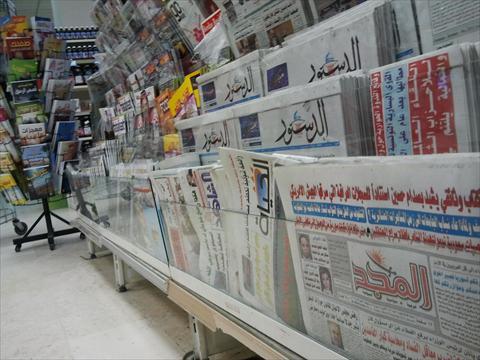You are here
‘Media freedom in Jordan dropped by 12 percentage points in 2013’
By Mohammad Ghazal - May 03,2014 - Last updated at May 03,2014

AMMAN — Freedom of the press in Jordan dropped by 12 percentage points to 41 per cent in 2013 compared to 2012, according to the Media Freedom Status in Jordan 2013 Report released on Saturday, which marks World Press Freedom Day.
The number of journalists who believe media freedom in the country is on the decline has been increasing over the past three years, standing at 21.3 per cent in 2013, 14 per cent in 2012, and 11.9 per cent in 2011, said the report, prepared by the Centre for Defending Freedom of Journalists (CDFJ) in cooperation with a specialised polling company.
Those who believe that press freedom advanced significantly fell to 6.9 per cent in 2013, compared with 8.5 per cent in 2012 and 15.4 per cent in 2011.
A third of journalists, or about 31.7 per cent, believe that media freedom remained unchanged in 2013, CDFJ President Nidal Mansour said in a press conference to announce the findings of the survey, which covered 460 journalists from the private and public sectors.
The state of media freedom in the eyes of journalists also deteriorated, with 3.9 per cent saying it is in an excellent state, while 29.7 per cent rated it as low, according to the report.
“The decline in press freedom in Jordan is expected as the government blocked more than 290 websites in 2013 when it started enforcing the controversial Press and Publications Law,” Mansour told reporters.
Some 49.5 per cent of journalists believe that blocking unlicensed websites is a restriction on media freedom, while 23.4 per cent say it enhances it and 26.9 per cent feel it has no effect, the report showed.
Journalists are increasingly convinced that the government is not serious about implementing constitutional amendments related to media freedom, a view shared by 29.9 per cent of respondents. Only 5.4 per cent believe that it is very serious about implementing these amendments, while 32.3 per cent believe that it is moderately serious and 31.5 per cent slightly serious.
Government interference remained an obstacle to media freedom in 2013, the report indicated, a view held by 84.2 per cent of journalists compared with 59.4 per cent in 2004.
A majority (91.3 per cent) of journalists said they exercised self-censorship in 2013, compared to 85.8 per cent in 2012.
“The most logical explanation of this result is that the restrictions imposed by the Press and Publications Law on the electronic media were not limited to journalists; they went further to comments posted by citizens on the news published in news websites, which prompted journalists to exercise self-censorship on the comments, in addition to great caution in writing the news for fear of prosecution,” the report said.
Meanwhile, the army remained the organisation that journalists avoid criticising the most, followed by the judiciary, tribal sheikhs and leaders, and security agencies.
One-fifth, or 21.5 per cent, of respondents acknowledged that they were subjected to attempts of soft containment inducement, and (offers of) privileges in the course of their journalistic work, according to the report.
Meanwhile, 50.1 per cent said that they heard about colleagues who were subjected to soft-containment attempts.
The government and its institutions plus semi-governmental organisations led in attempts to offer privileges to journalists (27.1 per cent and 4.8 per cent respectively), followed by businessmen (28.9 per cent), commercial enterprises and advertising companies (16.9 per cent), security agencies and civil society organisations (5.4 per cent) and political parties (4.2 per cent).
Forms of soft containment varied, according to the report, with financial donations and gifts remaining the most common (44.3 per cent), followed by facilitation of services and procedures by official institutions (20.7 per cent), appointment to a governmental or semi-government position (20 per cent), exemptions from customs or receiving free medical treatment or education (5 per cent) and invitations to travel abroad (4.3 per cent).
News websites were in the forefront in accusations of accepting gifts, followed by private radio and television stations (71.8 per cent), weekly newspapers (69 per cent), dailies (63.8 per cent) and the official media (60.8 per cent).
In terms of violations, 34.1 per cent of the surveyed journalists said that they were subjected to pressure and harassment in 2013, compared with 36.2 per cent in 2012.
Related Articles
Media freedom in the country remained unchanged in 2014 when compared to 2013 and did not witness any significant improvement, according to a report released on Monday.
Media freedom in Jordan witnessed a further decline in 2013 compared to 2012, according to a report issued by the Jordan Press Association (JPA).
AMMAN — Over 80 per cent of media professionals in Jordan described press freedoms in 2016 as “low, acceptable or medium”, according to a re












